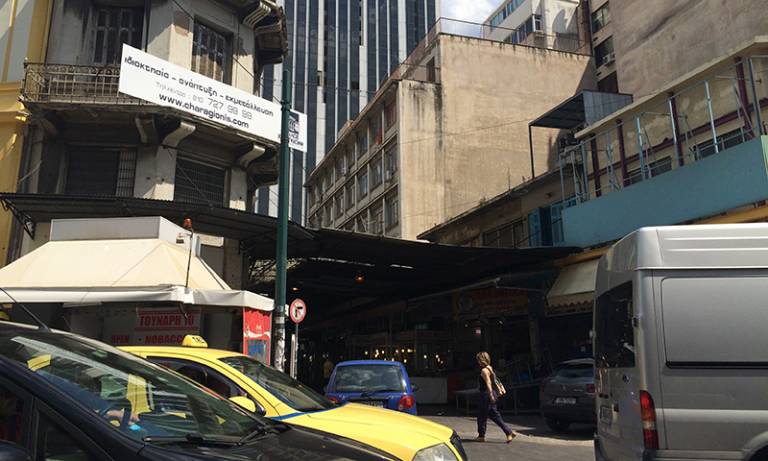10-15 September in collaboration with Stefania Gyftopoulou (Open Architecture Collaborative)

Athens has been marked as a city in crisis. Austerity policies have generated rapid social and economic changes, which are already evident in the physical and social urban fabric. Urban development policies – while aiming to re-inform the city – have intensified the conflictive transformation of urban space, its usage, its perception and its appropriation.
Such urban dynamics have been accompanied by abrupt changes in nation-wide immigration and asylum-seeking patterns. Greece, being initially a transit country, has faced major challenges concerning the reception of migrants and refugees, and the coverage of their basic needs. Being this no longer an emergency situation, the Humanitarian Aid department of the European Commission (ECHO) has decreased the provision of funds and the dominant rhetoric has shifted from a need of a life saving operation to that of integrating migrants and refugees in the country. Integration – being by definition a dynamic and gradual process with economic, social, cultural, political and legal dimensions – involves both the individual and the receiving society. This is creating the conditions for cross-sectorial urban interventions: while in the humanitarian context the beneficiary of aid is the individual, shifting the focus to the urban realm as a whole, at multiple scales, could allow for a more inclusive and ultimately human-centred process.
Many cities, including the Municipality of Athens, have assumed a more active role in terms of governance, for what concerns both the management of programmes an the direct reception of funds. Through participating in nation-wide competitions such as the Mayors Challenge sponsored by Bloomberg Philanthropy, participatory design and the culture of volunteerism have taken centre stage in urban politics, providing the opportunity to explore how such methodologies can impact local regeneration in the age of austerity.
The Athens summerLab wants to offer a contribution and a reflection around the potential role of urban planning, urban design and architecture in supporting the long-term integration of refugees and migrants. In so doing, we want to identify, discuss the impact of different urban strategies, and to formulate possible alternative responses.
The Athens summerLab’s participants will be exposed to a variety of urban actors and practitioners to critically explore the different roles, relations and coordination between local authorities, private entities, grassroots organisations, NGOs, activists, migrants and refugees. Current shifts in urban governance with the municipality assuming a more active role, aiming to promote participatory design and the culture of volunteerism will be presented, providing the opportunity to explore how such methodologies can impact local regeneration in the age of austerity. Through city walks, participants will initially explore the effects of the economic crisis on the different urban and building typologies such as the polykatoikia, ground floor spaces, semi-public and public spaces etc. Additionally, participants will get familiarised with the geographical locations of both formal and informal responses to the so called refugee crisis and explore the visible and not so visible ways in which the static presence of migrants and refugees alter the urban landscape. Revealing and reimagining the city’s available urban and housing stock will indicate potential room for the construction of an inclusive vision of urban transformation. The outcomes of the workshop will be presented in a final meeting with summerLab’s partners and local actors.
Click here to download the application form or write to us at dpusummerlab@ucl.ac.uk to express your interest. Further information will be provided in due course. Stay tuned and follow our Facebook page for updates!
Application and fees
The DPU summerLab is open to all students and professionals with an interest in urban environments.
- Fees
- The international participation fee for each workshop is £375 (early-bird discounted rate) or £425 (standard rate). The fee is discounted to £275 (early-bird rate) or £325 for: currently enrolled DPU students (2016-17), DPU alumni, and group applications (5 people or more). Discounted fees apply for participants intending to register to multiple workshops too, please contact us for further info. If you wish to submit a group application (five people or more), please use the ‘group application form’ instead (you can find this below in the ‘Applications’ section). Please note these fees do not include travel or accommodation, though advice and local information will be provided.
- Visas
Participants are responsible for obtaining any visa they might require to which the DPU can provide proof of workshop registration if needed.
- Personal equipment
Participants will need to bring their own laptops and digital equipment. Please ensure that this equipment is covered by your own insurance as the DPU cannot take responsibility for items lost or stolen during the workshop.
- Applications
The deadline for application for the 2018 series will be on Monday 2 July. The deadline for early-bird applicants is on Monday 4 June. The applicant will need to e-mail the form, along with a CV and a letter of motivation to dpusummerlab@ucl.ac.uk
 2018_application_form_individuals.docx
2018_application_form_individuals.docx
 Close
Close

